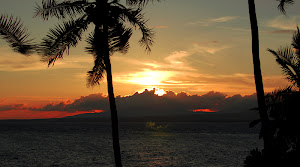Lakbay Aral, means “study tour”, and in that context I had the pleasure to meet Hannah Meditar, a member of the government agency that concerns itself with waste treatment and environmental issues. Working out of South Cotabato (region 12), she was a participant on a fact finding mission to Several Negros communities. Lakbay aral is organized and sponsored by Environmental Governance 2 a USAID project in which Mr. Ferdinand Esguerra is the regional coordinator of South and Central Mindanao.
The first group had a total of 31 participants.
Provincial Technical Working Group (PTWG):
1. Cotabato Province - 6 participants - 1 Provincial Planning and Development Office (PPDO) and 5 active PTWG members)
2. South Cotabato - 4 participants Provincial Environmental Management Officer (PEMO) Ramon B. Ponce de Leon and active PTWG members.
Municipal LGUs
1. Magpet - 6 participants: MENRO, 5 active TWG members
2. Pres. Roxas - 6 participants MENRO, 5 active TWG members
3. Kabacan - 6 participants Hon. Mayor George Tan, 5 active TWG members
Ecogov
2 participants
DENR Environmental Management Bureau (EMB)
1 participant
Hannah’s office is DENR-Environmental Management Bureau (EMB) based in Koronadal City , Region 12. Its vision is “a nation empowered to protect our finite natural resources, attuned to the pursuit of sustainable development, for a clean and healthy environment that enhances the Filipino quality of life for present and future generations”. Its mission is “to restore, protect and enhance environmental quality towards good public health, environmental integrity and economic viability”. Locally, EMB visions a “Pollution-free Region XII” and to realize its mission “to establish and carry out the vision, to ensure public health, environmental protection and safety and to adhere excellent practice of good governance”.
Their mission in Negros was to examine some newer facilities for waste water treatment and solid waste disposal. The idea was to gather information and see if some ideas could be taken back and modeled by other communities in Region 12.

Dumaguete was one of the communities examined both for waste water treatment from the public market, and its solid waste management program. In addition the group surveyed local recycling efforts, and visited local organizations involved with making products from various recycled materials. There are a variety of programs that many people might not be aware of. For example some barangays and local universities are recycling a wide array of materials including
· demonetized currency
· plastic bottles and bags
· newspaper
· vermiculture composting projects
· glass
The Vermiculture composting facility is located in Barangay Calindagan. They are using biodegradable waste to manufacture compost for gardening. St. Pauls University is involved in the Plastics recycling, making shopping bags and rope from plastic bottles among other products. Here is a picture of the Mayor of the Municipality of Kabacan in North Cotabato, Hon. George B. Tan examining products made from recycled paper.
Here is a picture of the Mayor of the Municipality of Kabacan in North Cotabato, Hon. George B. Tan examining products made from recycled paper.
What I learned from talking to Hannah was that there are indeed many people in the Philippines who are concerned about the environment and pollution, both in the government and private sectors. While these initially may be small efforts, every effort contributes to a better environment. What I was not aware of was the depth of local interest in researching the conversion and use of recycled products.
Sunday, June 1, 2008
Lakbay Aral
Labels:
dumaguete,
Philippine life
Subscribe to:
Post Comments (Atom)





3 comments:
thank you for taking time to post our study observations and photos at your blog, i do appreciate it very much.
...recycling initiatives in the Philippines are slowly taking place but hopefully, more people will be aware of the benefits, not only for environmental concern but financial aspects as well. btw, RHB, my office is a product of a merger of two offices – National Pollution Control Commission (NPCC) and National Environmental Protection Council (NEPC). EMB is more of regulatory agency that concerns with the implementation of six environmental laws, namely: 1) Environmental Impact Assessment (EIA) System law (PD 1586), 2) National Pollution Control Law (Presidential Decree 984), 3) Toxic Chemicals and Hazardous Waste Substances law (R.A. 6969), 4) Philippine Clean Air Act (R.A. 8749), 5) Philippine Clean Water Act (R.A. 9275), and 6.) Ecological Solid Waste Management Act (R.A. 9003. (hence, its not really concerns only with waste treatment, or depends with what you said, perspective hahaha)
Hannah, Thanks for the additional information and append. The big issue here is simply getting the info out in the local area. For example phone numbers for resources and collection in newspapers. Many folks might avail themselves of services if they just knew where to go.
Post a Comment